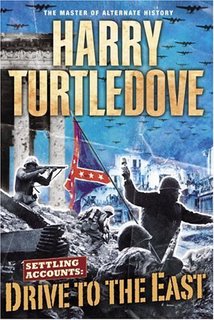 I'm a big fan of the fiction genre known as alternate history. This can be challenging for a fan, because very little quality alternate history is published on a regular basis.
I'm a big fan of the fiction genre known as alternate history. This can be challenging for a fan, because very little quality alternate history is published on a regular basis.It is not a genre that many people can write well because it requires strong background knowledge of the time period in question. The key to quality alternate history is realism. A lack thereof can be crippling, well-demonstrated in the novel 1901, which focuses on a hypohetical war between the US and Germany during that period of time. History majors like myself raise questions when reading this book such as "Why would Germany want to go to war against the US at the time? How is Germany able to move a massive invasion fleet capable of landing and supporting several hundred thousand troops across the Atlantic without being detected until troops have waded ashore in New York City? Why do these 19th Century people have very 20th Century attitudes about race and gender?" And so on.
Harry Turtledove, a Ph.D-trained historian, does not make these mistakes. His novels are very realistic, including his recent addition Settling Accounts: Drive to the East. This novel is his ninth in a series in which the South wins the Civil War and successfully forms an independent nation. The USA and CSA clash again in the 1880s, the 1910s, and now in the 1940s. The USA is presently allied with Germany and Austria-Hungary (who won WWI) against Japan, France, Britain, and the Confederacy.
After being defeated in the last war (a surprise, after winning the previous two), the Confederacy went through a series of political and economic crises that led to a fascist government vaguely resembling that of Nazi Germany.
The most fascinating parts of this book focus on Jefferson Pinkard, a broken down old Confederate soldier from WWI. Having some experience running a POW camp in the war, Pinkard is placed in charge of a internment camp for rebellious Blacks. Eventually more and more Blacks are sent to this severely overcrowded camp. Totally out of room, Pinkard is desperate and orders some Blacks trucked out into the swamp and shot in order to make room for new arrivals.
But even more Blacks are sent to the camp. And more. And more. Mass executions become increasingly routine. Almost unconsciously, the Confederate hierarchy conceives of a Final Solution to the Black problem. Pinkard is ordered to build more camps, and he does so in West Texas.
The guards can't handle the mass shootings. Depressed, some kill themselves. One does so by running a hose from the exhaust pipe of his truck to the cab. That gives Pinkard an idea of a way of killing Blacks more efficiently: gas. So he builds trucks with sheet metal containers on the back. Blacks are taken from the camp and put into the trucks, informed that they are being moved to another camp. The truck drives out of the camp toward a mass grave. Once out of the camp, the box is sealed airtight and exhaust fed in. The Blacks die and are thrown into the mass grave. Repeat as necessary.
As the war goes increasingly badly for the Confederacy, it blames its woes on the Blacks. Troops empty out ghettos en masse and ship their residents to the camps. But production is too high for Pinkard to keep up. The trucks are inefficient and cannot keep up with, shall we say, 'demand'. So he gets an idea: feed incoming blacks into fake shower and delousing buildings, where they are sealed in and gassed.
And so it goes.
In the beginning, Pinkard is just looking for a job. Step by step, he engages in the worst evils imaginable. He starts out as an ordinary guy, and becomes an extraordinary monster. What's so disturbing about Pinkard and the people who work for the camps is how they seem to be normal people who are gradually willing to do monstrous things. Turtledove is saying "This could be you. You have it within you to be evil incarnate."
Such is the path of sin.

3 comments:
Speaking of "alternate history", have you read "The Da Vinci Code"? Dan Brown very skillfully mixes and mingles realism with fiction to come up with a story that caused me to have to stop and go back to determine where the fact separated from the fiction, and vice versa. It was an incredible read.
No, I have not yet read it. I don't plan on it either -- and for any ideological reasons. My wife said that it was poor fiction that became a bestseller by saying something provocative. Sort of like the Left Behind series, which on its own merits, should never have made it to publication.
Too bad. It's a good read that makes no claims, biblical or otherwise.
Post a Comment